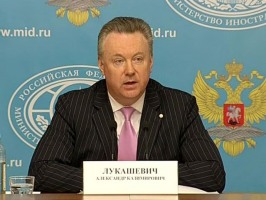Foreign Ministry Spokesman Alexander Lukashevich responds to a question from the media about public statements by Ukraine’s Permanent Representative to the EU
Question: What are your thoughts on the recent interview by Ukraine’s Permanent Representative to the EU Konstantin Yeliseyev with Ukrainian news agency UNIAN, which, by the way, was reprinted by several EU media outlets, in which he criticised the EU High Representative for Foreign Affairs and Security Policy Federica Mogherini for her position in favour of establishing a constructive dialogue with Russia, including with regard to the Ukraine crisis?
Alexander Lukashevich: Of course, Moscow took note of the offensive interview by Mr Yeliseyev in which the Ukrainian diplomat, in an impertinent manner, tries to lecture the EU High Representative for Foreign Affairs and Security Policy Federica Mogherini.
I’ll leave it to Brussels to comment on such “moralising” toward a European diplomat. However, it’s clear that it is in no way conducive to settling the Ukraine crisis and betrays Yeliseyev as someone who represents Kiev’s party of war.
The timing of these attacks on Mogherini is not accidental. On 19 January, a meeting of the EU Foreign Affairs Council will take place in Brussels, where the EU foreign ministers will, among other things, discuss prospects for EU-Russia relations.
Our position regarding Russia-EU relations is clear and unequivocal. We have repeatedly stated that we will not discuss any preconditions for lifting sanctions on Russia. However, Russia is not opposed to equitable cooperation with the EU in various areas. Despite the crisis in our bilateral relations, our agenda includes challenges that none of the parties can cope with on its own. These include international terrorism, organised crime and the Ebola virus, as well as a number of regional conflicts, such as in Syria and the broader Middle East, and resolving the issues surrounding Iran's nuclear programme.























